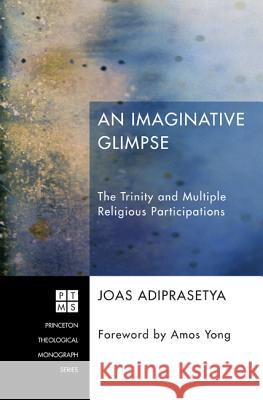An Imaginative Glimpse: The Trinity and Multiple Religious Participations » książka
An Imaginative Glimpse: The Trinity and Multiple Religious Participations
ISBN-13: 9781620326992 / Angielski / Miękka / 2013 / 218 str.
An Imaginative Glimpse: The Trinity and Multiple Religious Participations
ISBN-13: 9781620326992 / Angielski / Miękka / 2013 / 218 str.
(netto: 123,31 VAT: 5%)
Najniższa cena z 30 dni: 127,71
ok. 16-18 dni roboczych.
Darmowa dostawa!
In contrast to the popular notion that the doctrine of the Trinity hinders Christians from engaging with the reality of religious diversity, this book argues that the doctrine is the best way of constructing contemporary theology of religions. An Imaginative Glimpse reexamines three prominent Trinitarian theologians of religions (Raimundo Panikkar, Gavin D'Costa, and S. Mark Heim) and proposes a fresh and creative model by bringing the classical idea of perichoresis to its present-day multifaith situation. Opening a new alternative in both Trinitarian theology and theology of religions, Adiprasetya's approach adds a distinctive contribution to the ongoing and challenging discussion in both fields. By using perichoresis imaginatively as a multidimensional category for multiple religious participations within the Trinity, Adiprasetya argues that the model is able to respect all religions on their own terms, while at the same time being faithful to the Christian standpoint. "In this insightful and theologically grounded work, Adiprasetya engages with great expertise and grace the three leading Trinitarian theologians of religions: Panikkar, D'Costa, and Heim. The end result of this sympathetic and critical dialogue is an innovative proposal to negotiate religious pluralism." --Veli-Matti Karkkainen, Professor of Systematic Theology, Fuller Theological Seminary "Adiprasetya interestingly draws from Moltmann's 'open Trinity' and Kearney's 'God who may be' to think beyond the solutions that Panikkar, Heim, and I have proposed in using the Trinity to reflect on religious pluralism. Adiprasetya opens up new creative avenues in freshly employing perichoresis in this field. His work is stimulating and raises significant questions." --Gavin D'Costa, Professor of Religion and Theology, University of Bristol "Adiprasetya's book lifts perichoresis out of its original, strictly theological context--the Christian doctrine of the Trinity--into a broader philosophical context, namely, a new paradigm for the One and the Many as applied to interreligious dialogue." --Joseph Bracken, Emeritus Professor of Theology, Xavier University "An Imaginative Glimpse is a multifaceted gem. It engages with sharp clarity and scholarly rigor a host of contemporary theologians thinking about the Trinity and world religions. . . . Despite its range, however, the book develops a coherent argument, sympathetic but dialectical, leading a new way forward for Christians to think about religions other than their own." --Robert C. Neville, Professor of Philosophy, Religion, and Theology, Boston University "Christian theology cannot avoid the challenges religious plurality offers to key aspects of its self-understanding. Creative theological responses are required. In this well-argued book Adiprasetya offers a fundamental basis for such engagement--the Trinitarian understanding of perichoresis--and explores imaginatively . . . how this classical Christian doctrine can provide an important resource as Christians today seek to engage the religiously complex worlds in which they live." --Clare Amos, Program Coordinator, Interreligious Dialogue and Cooperation, World Council of Churches Joas Adiprasetya is the President of Jakarta Theological Seminary, Indonesia, where he also teaches systematic theology and theology of religions."
In contrast to the popular notion that the doctrine of the Trinity hinders Christians from engaging with the reality of religious diversity, this book argues that the doctrine is the best way of constructing contemporary theology of religions. An Imaginative Glimpse reexamines three prominent Trinitarian theologians of religions (Raimundo Panikkar, Gavin DCosta, and S. Mark Heim) and proposes a fresh and creative model by bringing the classical idea of perichoresis to its present-day multifaith situation. Opening a new alternative in both Trinitarian theology and theology of religions, Adiprasetyas approach adds a distinctive contribution to the ongoing and challenging discussion in both fields. By using perichoresis imaginatively as a multidimensional category for multiple religious participations within the Trinity, Adiprasetya argues that the model is able to respect all religions on their own terms, while at the same time being faithful to the Christian standpoint."In this insightful and theologically grounded work, Adiprasetya engages with great expertise and grace the three leading Trinitarian theologians of religions: Panikkar, DCosta, and Heim. The end result of this sympathetic and critical dialogue is an innovative proposal to negotiate religious pluralism."--Veli-Matti Kärkkäinen, Professor of Systematic Theology, Fuller Theological Seminary"Adiprasetya interestingly draws from Moltmanns open Trinity and Kearneys God who may be to think beyond the solutions that Panikkar, Heim, and I have proposed in using the Trinity to reflect on religious pluralism. Adiprasetya opens up new creative avenues in freshly employing perichoresis in this field. His work is stimulating and raises significant questions."--Gavin DCosta, Professor of Religion and Theology, University of Bristol"Adiprasetyas book lifts perichoresis out of its original, strictly theological context--the Christian doctrine of the Trinity--into a broader philosophical context, namely, a new paradigm for the One and the Many as applied to interreligious dialogue."--Joseph Bracken, Emeritus Professor of Theology, Xavier University"An Imaginative Glimpse is a multifaceted gem. It engages with sharp clarity and scholarly rigor a host of contemporary theologians thinking about the Trinity and world religions. . . . Despite its range, however, the book develops a coherent argument, sympathetic but dialectical, leading a new way forward for Christians to think about religions other than their own."--Robert C. Neville, Professor of Philosophy, Religion, and Theology, Boston University"Christian theology cannot avoid the challenges religious plurality offers to key aspects of its self-understanding. Creative theological responses are required. In this well-argued book Adiprasetya offers a fundamental basis for such engagement--the Trinitarian understanding of perichoresis--and explores imaginatively . . . how this classical Christian doctrine can provide an important resource as Christians today seek to engage the religiously complex worlds in which they live."--Clare Amos, Program Coordinator, Interreligious Dialogue and Cooperation, World Council of ChurchesJoas Adiprasetya is the President of Jakarta Theological Seminary, Indonesia, where he also teaches systematic theology and theology of religions.











